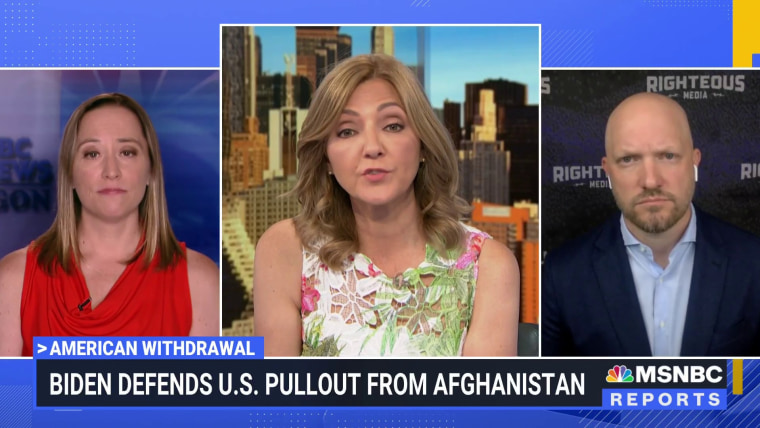WASHINGTON — President Joe Biden can't speak the obvious truths about his decision to rapidly withdraw U.S. troops from Afghanistan: There was no good way to leave, America lost more than it gained in a 20-year war and the Taliban is almost certain to take over now.
To say any of those quiet parts out loud, Biden would undercut the political value of being the president who pulled the U.S. out of its longest war. And his decision has all the makings of a political victory.
The public is with him: Polls show a strong majority of Americans support withdrawing troops. He is executing on a policy first announced by former President Donald Trump, which means he has some degree of political cover if the sentiments of the electorate shift over time. The withdrawal is unifying for Democrats — who overwhelmingly back it — while Republicans are more divided over it.
The main risks for Biden are failing to walk a fine line on his messaging and, of course, the ever-present possibility that public opinion will shift over time. But it seems unlikely that any outcome in Afghanistan will make Americans believe it is worth going back — or that it was wrong to leave — in the foreseeable future.
So the real political challenge is in what he says, and doesn't say, about the situation.
For example, Biden refused this week to acknowledge the likelihood that the Afghan military will fold, a concession that would surely further weaken the government's forces as it tries to fend off a rapidly advancing Taliban.
"It is not inevitable," Biden said this week of a possible Taliban takeover. "I trust the capacity of the Afghan military, who is better trained, better equipped and more competent in terms of conducting war."
But Biden also noted the Taliban "is at its strongest militarily" at exactly the moment the U.S. is walking away. He also took issue with Republicans, and at least a handful of Democrats, who have criticized him for not sticking it out a little longer and with those who compare the retreat to the searing image of Americans lining up to take the last chopper out of Saigon at the end of the Vietnam War.
"There’s going to be no circumstance where you see people being lifted off the roof of a embassy in the — of the United States from Afghanistan," Biden said. "It is not at all comparable."
Yet his rationale for departing was strikingly similar to the question his good friend John Kerry asked the Senate Foreign Relations Committee in 1971 while testifying as an anti-war veteran.
"How do you ask a man to be the last man to die for a mistake?" Kerry asked.
This is what Biden said about leaving Afghanistan: "So let me ask those who wanted us to stay: How many more — how many thousands more of America’s daughters and sons are you willing to risk? How long would you have them stay?"
Of course, Biden insisted the U.S. had met its goals in Afghanistan, framing them narrowly around killing Osama bin Laden and ensuring the country is not a safe haven for terrorists. Bin Laden has been dead for more than a decade, and Al Qaeda's capacity to launch attacks on the U.S. from Afghanistan had been taken away long before that. In other words, Biden's implication is that the last decade of U.S. engagement was superfluous to the mission.
Former President Barack Obama, for whom Biden served as vice president, defined success as stabilizing Afghanistan in 2009. The withdrawal promises to further destabilize a nation that has seldom resembled a stable state in the last half-century.
Ohio Rep. Mike Turner, a senior Republican on the House Armed Services Committee, called the rapid redeployment of U.S. forces "more of a surrender than a withdrawal."
It's not that Turner opposes winding down U.S. operations in Afghanistan; he backed Trump's decision to set a May 2021 deadline for withdrawal. But he believes Biden irresponsibly abandoned Afghan forces without warning.
"He's not leaving a plan for them to execute," Turner said, arguing it will hurt U.S. foreign policy because it "lowers everyone's confidence" in Biden's decision-making.
There's no doubt Republicans will hammer Biden if the Taliban defeats the Afghan forces, and they will point to this moment in time as pivotal. But there's plenty of evidence to suggest the public is more concerned with ending U.S. military engagement in Afghanistan than it is with preventing the Taliban from taking over.
Biden has demonstrated that he, too, prioritizes getting out over what's left behind. That's a tough message for U.S. allies to hear — that the U.S. will act in its own perceived interests, regardless of the consequences for everyone else — so Biden left it unspoken.
He put America first. He just didn't say it.
"in" - Google News
July 11, 2021 at 02:07AM
https://ift.tt/3hwbo5P
Biden put America first in exiting Afghanistan. He just can't say it. - NBC News
"in" - Google News
https://ift.tt/2MLa3Y1
https://ift.tt/2YrnuUx
Bagikan Berita Ini















0 Response to "Biden put America first in exiting Afghanistan. He just can't say it. - NBC News"
Post a Comment